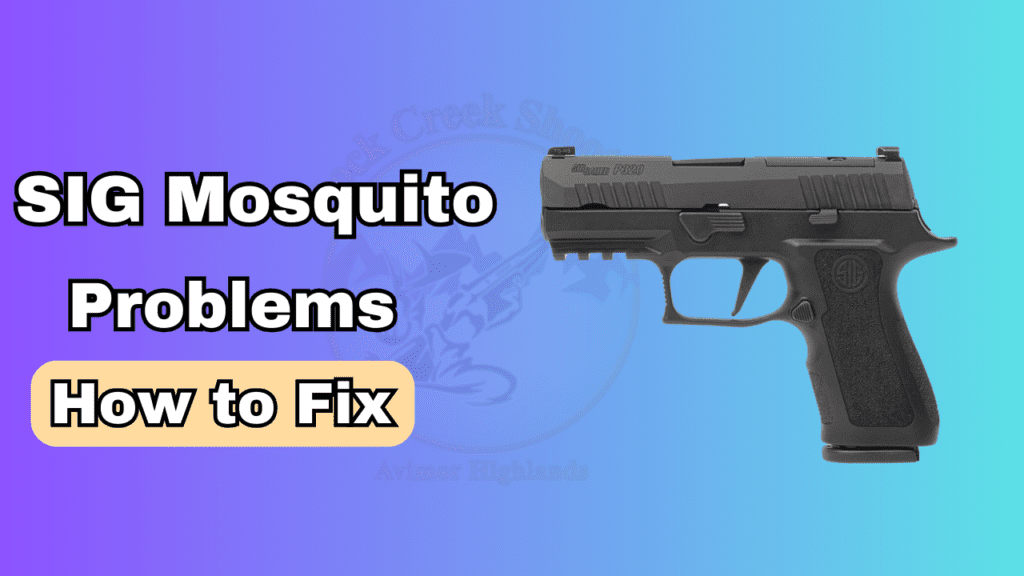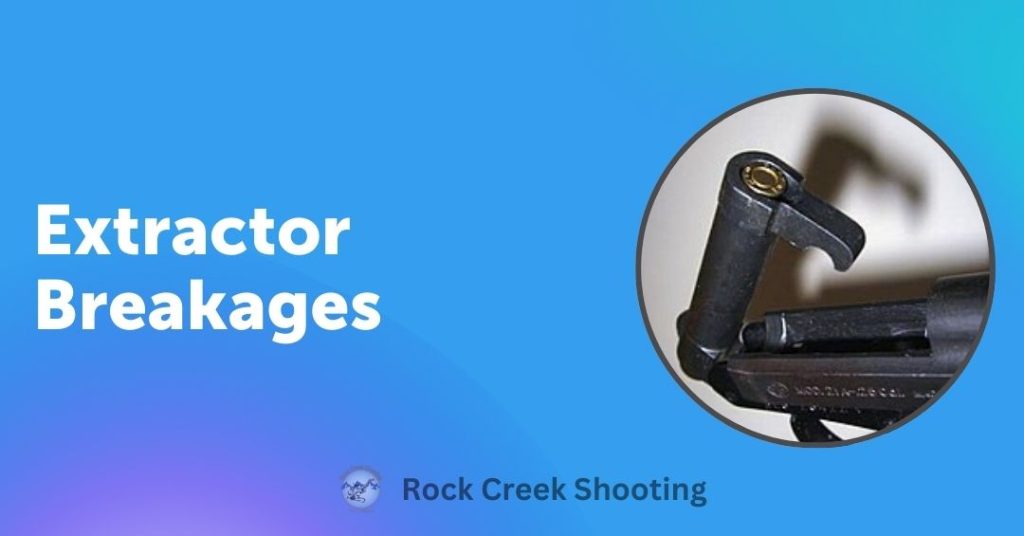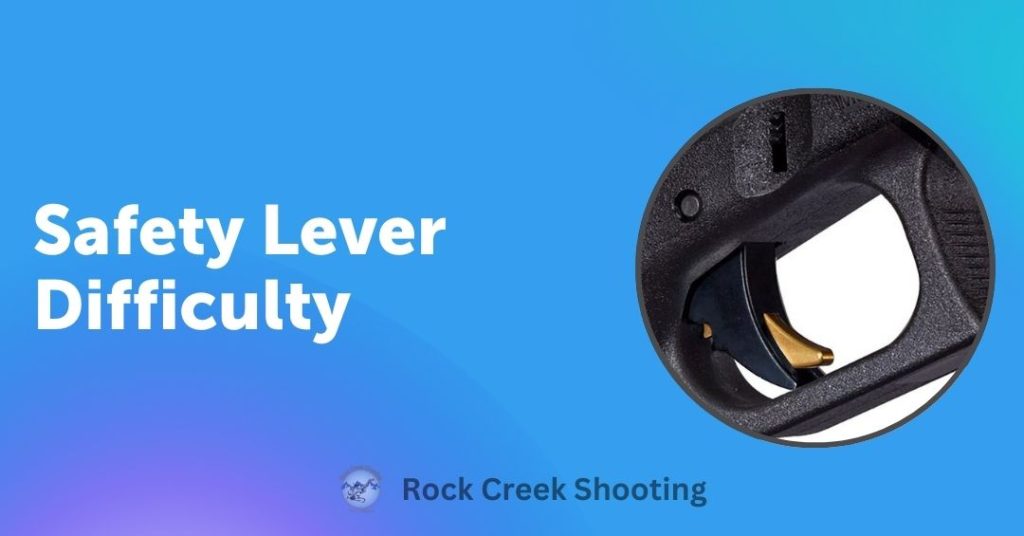
Hello there! Having issues with your Sig Mosquito? Despite its sleek design and the Sig Sauer prestige, it’s known to be a bit troublesome for some owners. Not sure how to tackle these problems? Don’t worry, we’re here to help and guide you through fixing them.
From magazines that won’t stay put to tricky triggers and annoying feeding issues, we’ve tackled all the common problems. We always keep things super simple, and this time is no exception. Ready to get your Sig Mosquito working better? Let’s get started!
Overview of Problems with the Sig P938 Legion and Their Solutions
| Issue Type | Recommended Solution |
| Hammer Problems | Clean with solvent, check for wear, replace parts if needed, oil it and maybe change springs. |
| Feeding & Ejection | Use CCI Stingers or similar high-velocity ammo; ensure thorough lubrication; consider switching to metal magazines. |
| Extractor Issues | Adjust extractor for a better fit or opt for lighter springs if necessary. |
| Trigger Concerns | Perform regular maintenance and cleaning; adjustments might be needed for better responsiveness. |
| Safety Mechanism | Professional assessment and service from Sig Sauer recommended. |
| Magazine Compatibility | Make sure magazines click securely into place; explore replacement options for persistent problems. |
This table encapsulates the main issues faced by Sig Mosquito owners and offers concise solutions for each.
The Ultimate Guide to Overcoming Sig Mosquito Problems
Hammer Problems
Having trouble with your Sig Mosquito’s hammer? You try to shoot, but the hammer won’t move; it just stays put. It should stay back after you shoot, but it sticks and goes down with the slide.
When it hits, it’s too soft, like it’s gently tapping the firing pin and not hitting hard enough. So, your bullet doesn’t fire. Let’s dive right in and get that sorted out for you, nice and smooth.
Solution
Okay, let’s break this down and get each issue sorted, making sure your Mosquito is empty first, alright?
Clean Sweep: First up, dirt and grime are no friends of yours. Get in there with some solvent and clean out the hammer area. It’s often just a cleanliness thing.
Eyes on the Prize: Take a look at the hammer and the parts around it. See anything that looks worn out? Sometimes, a fresh part is all it takes.
Grease Lightning: After cleaning, give everything a good but light oiling. It’ll make the hammer glide like a dream.
Spring Into Action: If those springs are feeling a bit tired, they might not be giving the hammer the push it needs. A new spring could just do the trick.
A Few Friendly Tips
No Rush: Especially if this is your first rodeo. Take your time, and you’ll get there.
Need a Hand?: If you hit a wall, there’s no shame in asking for a bit of help. Whether it’s a gunsmith or a buddy who knows their stuff, a second pair of eyes can be a game-changer.
Safety First: Just gotta say it again, make sure that gun is unloaded before you start tinkering.
With a bit of care, maybe swapping out a part or two, you’ll have it running smoothly again in no time. A touch of DIY spirit can go a long way.
Ammo Issues: Feeding & Ejection
So, your Sig Mosquito is being a bit picky, huh? Don’t get panicked; it’s pretty common. This little pistol has a taste for the good stuff—specifically, ammo that zips along at a higher velocity.
The Mosquito works on what’s called a blowback system. This means it needs the kick from the ammo to do its thing properly. If the ammo’s too slow, well, it’s like trying to start a campfire with damp wood—not much happens, and you’re left dealing with jams and feeding problems.

Solution
High-velocity rounds are your best bet, with CCI Stingers being a favourite. These rounds have the oomph to make sure everything runs smoothly from shot to shot.
But don’t just stop there. Giving your Mosquito a good oiling and swapping out those plastic magazines for metal ones can also make a huge difference. It’s all about giving it the right fuel and a bit of TLC.
Trust me, a little care goes a long way, and before you know it, your Sig Mosquito will be running smoother than ever.
Extractor Issues
Some owners face Sig Mosquito extractor issues, where it fails to hold onto the ammo properly, leading to ejection problems. Are you also facing those annoying ejection issues? This little trouble is often due to the extractor not playing nice with the ammo.
The extractor’s job is to grab the edge of the used bullet and toss it out after you shoot. If it’s not doing that, a few simple fixes can usually solve the problem. Here’s how you do that-

Solution
Check the Fit: If the extractor’s not sitting right, it won’t grab the cartridges well. It might need a little adjustment to fit perfectly.
Spring Tension: The extractor works with a spring. If that spring’s too stiff, it can mess with the extractor’s job. A lighter spring might be the answer to give it the right amount of flexibility.
Trigger Issues
Ever felt like your Sig Mosquito’s trigger is just not cooperating? Like you’re squeezing with all you’ve got and it’s just not giving you the smooth action you want? Yeah, that can really put a damper on your range day.
Turns out, this is a pretty common chat among Sig Mosquito owners, especially when talking about hammer and trigger issues.

Solution
Believe it or not, the secret to solving many trigger issues with your firearm actually lies in regular cleaning and maintenance. Over time, dirt, dust, and residue can sneak into the trigger mechanism. Dirt and residue can cause the trigger to feel heavy and slow. Cleaning the trigger mechanism thoroughly often fixes this.
If cleaning doesn’t improve the trigger, adjusting its mechanics might be necessary. This involves tweaking the spring tension to adjust the trigger pull weight or checking the trigger bar for proper alignment to reduce friction.
If you’re unsure about making these adjustments or if the problem continues, it’s wise to consult a professional gunsmith. They have the skills to accurately fix trigger issues, ensuring your firearm operates smoothly.
Regular maintenance, like cleaning and checking for wear on the trigger components, is crucial. Knowing your firearm’s mechanics can also help prevent issues and maintain its performance.
Magazine Issues
Sig Mosquito magazine problems, such as magazines falling out or failing to feed correctly. Ever had such a moment with your Sig Mosquito when the magazine decides it’s had enough and just drops out? Or maybe it’s not feeding ammo into the chamber like it should?
Yeah, it’s a pain when magazines start acting up, throwing a wrench into your shooting session.

Solution
First off, make sure that the magazine clicks in nice and tight. Sometimes, it’s as simple as giving it an extra push until you hear that satisfying click. It’s like telling your magazine, “You’re staying in whether you like it or not!”
But what if you’re doing that and the magazine still acts like it wants to escape? Or is it not feeding rounds smoothly? It might be time to look into getting a new magazine. Not all magazines are created equal, and sometimes, a brand-new one can solve all those annoying feed issues.
In the world of Sig Mosquito ownership, having a couple of reliable magazines in your kit is gold. So, if you’re dealing with magazines that just won’t cooperate, checking that they’re fully seated and considering a replacement are solid first steps to getting back to smooth shooting.
Safety Issues
Got some trouble with your Sig Mosquito’s safety? Like, it won’t click into place right, or it flips off when you least expect it? Yeah, that’s not ideal.
Safety’s the number one rule with guns, so when there’s trouble, you want to sort it out fast.

Solution
When it comes to safety issues, it’s super important to get things checked out by the pros. Sig Sauer’s own service team is your go-to in this case. They’ve seen it all before and know exactly what to look for.
For support, visit Sig Sauer’s Official Website or contact their customer service directly. Additionally, checking online forums like SigTalk or The Sig Armorer can provide further insights and solutions from other Sig Sauer enthusiasts.
Pro Tips to Overcome Common Issues: Solid Technical Information
Ammunition: Use high-velocity .22 LR ammunition like CCI Mini-Mags for reliable feeding and ejection. Avoid subsonic or low-velocity ammo that can cause jams.
Magazine Care: Clean magazines regularly to prevent feeding problems. Replace any that show signs of wear, especially damaged magazine lips.
Extractor Maintenance: Keep the extractor clean for consistent ejection. If extraction issues persist, it might need professional adjustment or replacement.
Trigger Care: A clean and lubricated trigger mechanism ensures a smoother pull. For heavy or inconsistent trigger issues, consult a gunsmith.
Safety Check: Ensure the safety lever operates smoothly. Any stiffness or malfunction should be professionally addressed.
Regular Cleaning: Clean and lubricate the pistol after use, focusing on the barrel, chamber, and slide rails. Check and possibly replace the recoil spring if you notice wear or face cycling issues.
Seek Professional Help: For any complex or persistent problems, especially those involving the gun’s internal mechanics, consult a qualified gunsmith.
By following these streamlined tips, you can maintain your Sig Mosquito’s performance and reliability effectively.
Sig Mosquito: Key Features and Specifications at a Glance
| Feature | Specification |
| Caliber | .22 Long Rifle |
| Action | Blowback-operated, semi-automatic |
| Frame Material | Polymer |
| Slide Material | Aluminum-Zinc Alloy |
| Barrel Length | 3.9 inches |
| Overall Length | 7.2 inches |
| Width | 1.5 inches |
| Height | 5.3 inches |
| Weight (without magazine) | 24.6 oz |
| Magazine Capacity | 10 rounds |
| Sights | Adjustable rear sight |
| Safety Features | Slide-mounted manual safety/decocker |
| Grip | Ergonomic grip design |
| Finish | Various, including black and two-tone options |
| Accessory Rail | Integrated for attachments |
This table breaks down the features and specifications of the Sig Mosquito into simpler terms, making it easy to understand what this .22 calibre semi-automatic pistol offers.
Sig Mosquito: A Compact Trainer’s Rise and Evolution
The Sig Mosquito, a compact .22 LR calibre semi-automatic pistol, was introduced by SIG Sauer as a smaller counterpart to its popular P226 model. Designed to mirror the aesthetics and ergonomics of the P226 but scaled down to 90% of its size, the Mosquito aimed to serve as an affordable training option due to the low cost of .22 LR ammunition.
Its features included a DA/SA trigger, adjustable sights, and an accessory rail, making it an attractive choice for both new and experienced shooters seeking a low-recoil firearm.
Despite its promising start, the Mosquito encountered reliability issues, particularly with ammo sensitivity, leading to feeding and cycling problems. These issues primarily occurred when using standard or low-velocity ammunition, as the pistol was optimised for high-velocity rounds for consistent performance. Additional reports of hammer and safety mechanism faults further affected its reputation.
SIG Sauer eventually discontinued the Mosquito, replacing it with new models like the P322, which addressed the Mosquito’s flaws while maintaining the benefits of a .22 training pistol. The discontinuation marked SIG Sauer’s commitment to quality and innovation, aiming to provide shooters with more reliable and refined .22 calibre options.
Today, the Sig Mosquito is remembered for both its potential as a training tool and the lessons learned from its challenges. It holds a place in firearms history as part of SIG Sauer’s continuous evolution in the gun industry, embodying the company’s efforts to balance performance, affordability, and user expectations in their product lineup
Concluding Thoughts
Every gun has its own little issues, and the Sig Mosquito is no different. By getting to know and fixing these problems, you can make your shooting time a lot better and really count on your Sig Mosquito.
Despite its few issues, loads of people still love their Sig Mosquito. With some smart fixes, you can turn it from being a bit of a headache into your trusty shooting buddy.
Remember, there’s always a way to fix these things. Sometimes, you just need to get a little creative and put in some effort. Happy Shoooooting!!
FAQs on Sig Mosquito Problems
Why do Sig Mosquito owners often report problems with their firearms?
The Sig Mosquito, a .22 calibre semi-automatic pistol, often faces issues related to feeding, the hammer mechanism, and reliability. These problems are usually due to the firearm’s sensitivity to ammunition type, maintenance level, and internal component wear.
Is the SIG Mosquito discontinued & why?
The Sig Mosquito was discontinued due to its reputation for reliability issues and the introduction of newer, more reliable models by SIG Sauer. The company aimed to improve on the Mosquito’s design flaws and meet customer expectations better.
Does the SIG Sauer Mosquito have safety?
Yes, the SIG Sauer Mosquito comes equipped with a safety mechanism. It features an ambidextrous manual safety that allows the shooter to safely engage and disengage the safety with either hand.
What should I do if my Sig Mosquito is having problems?
Start with a thorough cleaning and inspection for any visible wear on parts. Consider using high-velocity ammunition as recommended by SIG Sauer. If problems persist, consulting a professional gunsmith or contacting SIG Sauer customer support may be beneficial.
Are there aftermarket parts available to improve the Sig Mosquito’s performance?
Yes, there are aftermarket parts and upgrades available that can help improve the performance of your Sig Mosquito. These range from enhanced springs and guide rods to custom grips and magazines designed for better reliability.
